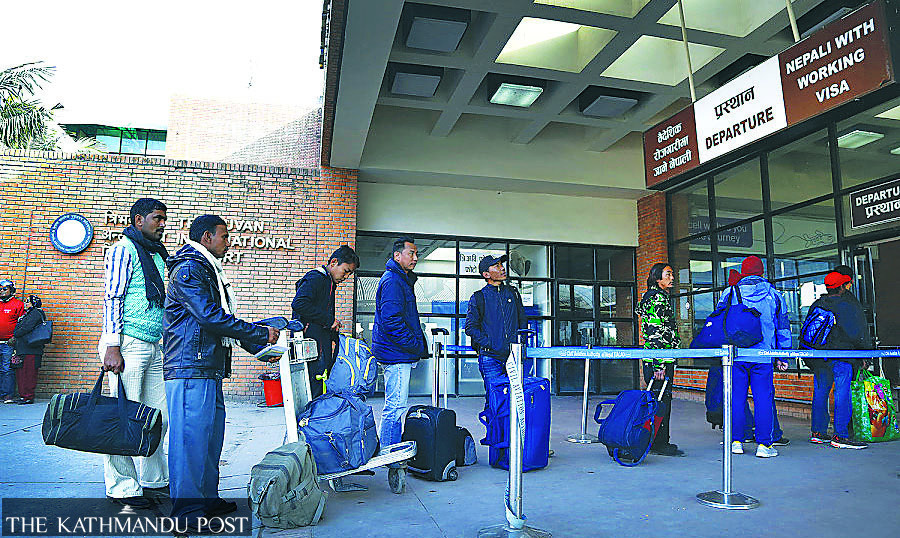National
Saudi employers will foot quarantine bills of Nepali workers
Experts say other destination countries should also follow suit. A stay at a Saudi quarantine facility would cost around Rs110,932.
Chandan Kumar Mandal
At a time when the labour destination countries have imposed strict rules for unvaccinated foreigners to the detriment of Nepali migrant workers, a recent decision by Saudi Arabia is likely to provide some respite for Nepali workers destined for the Gulf kingdom.
As Nepal’s major labour destination countries in the Persian Gulf are slowly easing travel restrictions, they are also either making Covid-19 vaccines compulsory for foreigners entering the country or making the entry relatively strict for unvaccinated ones. In most of these countries, unvaccinated visitors must spend a certain number of days in institutional quarantine facilities and bear the expenses themselves.
In what could be seen as a much-needed relief for Nepali migrants, the Nepali embassy in Saudi Arabia has said Nepali workers entering the kingdom will not be required to pay their quarantine bills.
Issuing a statement, the Nepali mission in Riyadh said the local employers would be paying the quarantine bills of Nepali workers.
According to the embassy, after it learnt that a stay at an institutional quarantine facility would cost a worker around Saudi riyal 3,500 [approximately Rs110,932], it had requested the Saudi authorities to exempt Nepali workers from the quarantine charges and that the employers bear those charges.
The Saudi government has formally informed the embassy that Saudi employers would be taking care of the quarantine expenses of Nepali workers, said the statement.
“The Saudi Arabian government agreeing to make employers pay the quarantine expenses is a welcome news for Nepal, a labour-sending country, and its migrants,” said Rameshwar Nepal, a labour migration researcher. “Although we need to see how the decision will be implemented in the coming weeks, the move is likely to benefit Nepali workers who have been waiting to visit Saudi Arabia and were affected by the quarantine rules.”
With the labour destination countries only allowing in vaccinated travellers or asking the unvaccinated ones to stay in expensive quarantines, these new requirements were believed to diminish Nepali workers’ overseas jobs prospects as Nepal has not succeeded in vaccinating a huge majority of its population.
“Nepali migrants who have returned home on job breaks could lose their entitlements, perks and benefits which they accumulated after working for several years. If they are unable to report back to work on time due to the new vaccination or quarantine rules, employers might ask them to end the contract,” said Nepal, who is also the executive director at Equidem Research Nepal, a human rights research organisation. “Besides, there are not enough jobs at home. So, many job-seekers could be left unemployed since they are either unvaccinated or unable to pay the hefty quarantine bills, as is the case with Saudi Arabia.”
According to Nepal, even the travel plans of those who have already received labour-permits could be affected because they would struggle to foot the quarantine bills.
“For now, at least the Saudi-bound Nepali workers would not have to worry about their quarantine expenses,” said Nepal.
The Nepali Embassy in Saudi Arabia has asked Nepali workers—newcomers and those returning after job breaks—to talk to their employers regarding the quarantine expenses and ask them to take care of the expenses.
Saudi Arabia, which is slowly allowing travel options for its vaccinated citizens and also giving entry to outsiders, has otherwise set strict rules for unvaccinated people. Foreign citizens arriving in Saudi Arabia must quarantine for a week in government-approved accommodations.
In May, as it eased travel restrictions, Saudi Arabia announced that only vaccinated employees would only be allowed to return to their workplaces in person. The Ministry of Human Resources and Social Development had said that Covid-19 vaccination would become a ‘mandatory condition’ for the face-to-face return of public and private sector workers.
Likewise, only vaccinated people will be allowed entry to any enclosed public places. Starting from August 1, the kingdom will ban unvaccinated people from entering shopping malls.
Later in May, Saudi Arabia announced that foreign visitors arriving by air from most countries would no longer need to quarantine if they have been vaccinated against Covid-19.
While unvaccinated workers are already not allowed to enter other labour destinations like Kuwait and the United Arab Emirates, workers headed for Saudi Arabia were left with no option other than to pay for quarantines.
Besides, as countries like Saudi Arabia have already removed mandatory quarantine for vaccinated foreign visitors, Nepali workers were even deprived of utilising such relaxation because of the country’s poor vaccination status.
Experts have been saying that the government should take diplomatic initiative to ease the burden of workers paying for expensive quarantine bills or to get them vaccinated at destination countries. They also say the government should prioritise inoculating them before flying, although it looks difficult given the existing shortage of vaccine.
Nepal, the migration researcher, who has been saying that the Nepal government or its missions should talk to the governments of the labour destination countries for relaxing the new rules for Nepali workers by explaining Nepal’s struggle for vaccine, says other destination countries should also follow suit of Saudi Arabia.
“The way the Nepali embassy in Saudi Arabia talked and resolved the matter is a good sign of labour diplomacy which ultimately provided relief to our workers. This also showed that such issues are doable and can be resolved if we take diplomatic initiatives,” said Nepal. “Other labour destination countries should also come forward to either relax such rules or pay the quarantine bills of Nepali workers. As labour destination countries need Nepali workers, it is also their responsibility and duty to take care of the workers during these testing times.”




 9.7°C Kathmandu
9.7°C Kathmandu














